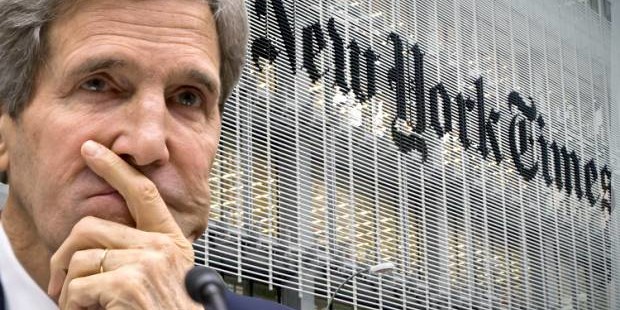
Misinformation, disinformation, lies: Can the New York Times’ foreign coverage be trusted at all?
The Times walks back a story about Syria and chemical weapons, a reminder of the media’s complicity with power
The big doings do not stop in the Middle East. We now have a deal on Iran’s nuclear program that anyone looking has to call historic. Next week talks on the Syria conflict are to convene in Switzerland, and the latest line is that Bashar al-Assad and the mostly awful opposition to his rule may permit relief and even accept a cease-fire.
It is almost enough to start getting excited. But not quite. The diplomatic effort on Iran sails close to the rocks as we speak, and the Syria talks (called Geneva II, though they will take place in Montreux) may prove a stillborn. These are vital questions for America and its 21st century fate, so let us hope for the best.
Two things to consider as we do our hoping. One, if diplomacy fails to settle these flashpoint issues it will be because Washington is not yet capable of taking diplomatic solutions seriously. Two, in the event of failure we are unlikely to read the above truth in our newspapers because they are not yet capable of writing the truth about American conduct in global affairs.
A few reasons for these concerns. We have the problem of unreasonable demands, for instance — conditions set with the unstated but evident purpose of scotching deals based on many-sided compromise. Secretary of State John Kerry thinks Assad should be in Montreux to negotiate himself out of office, even as his adversaries, who emerge as a collection of opportunists and sectarians, are too busy destroying one another to inspire any confidence in a better-than-Assad alternative.
I also count the American media a critical threat in this context. The history of their failure to maintain a working distance from power is long and craven, but things are worsening at the very wrongest moment. More on this in a moment, but for now: Misinformation, disinformation and worse again prove instrumental in keeping most of the electorate quiescent as Washington dresses up policies and strategies few would find acceptable were they honestly portrayed.
The deal struck last weekend between Iran and six outside powers, chiefly the U.S., is precious as gold. If the interim agreement produces a final settlement, Iran can come in from its long isolation and a 35-year enmity between Washington and Tehran can end. As I see it, Iran is one key to calm across much of the Middle East: in Syria (and by extension Lebanon), in Iraq, even in Egypt, to say nothing of the frightening tension that persists between Israel and the Islamic republic.
We can thank President Rouhani and his foreign minister, Javad Zarif, for this. President Obama and Kerry were nowhere near this kind of demarche when Rouhani, newly elected, more or less forced it down Washington’s gullet last summer. Remember those days — the U.N. General Assembly speech and all that? History sometimes arrives on First Avenue.
We were supposed to suspect the Iranians and were told to do so long after it was necessary. Obama eventually put together a negotiating operation, headed by a State Department hack named Wendy Sherman. Sherman supplied one of the notable quotations of the time when she testified before Congress. “Deception is in their DNA,” she said of the Iranians. Slurs do not get more disgraceful, but off Sherman went to open talks with Tehran.
I say we can thank Rouhani because he has proven out. He and Zarif are serious statesmen with vision and they have their conservative opponents in line. And we will have to thank him again if a final deal comes through, because Congress is this far from passing a new round of deal-scuttling sanctions. The midweek count — one can scarcely believe it — has 59 senators, including 16 Democrats, calling for additional sanctions. The administration is right to call this “a march to war.”
Some of this goes to America’s fundamentalist streak, no less contemptible than Iran’s. But these people are merely crude. The more profound worry is the influence of AIPAC, the infamous Israel lobby. The lobby owns most of those votes. A circumstance anticipated in this column last summer comes to be: Israeli intervention in the American political process now threatens to render the nation incapable of innovating out of a Middle East policy so outdated as to be dangerous — well, even more dangerous than it long has been.
When I think of U.S.-Israeli relations these days I find myself humming, “Something’s gotta give, something’s gotta give.” Something does, and it is likely to be the wrong thing — a deal with Iran essential to a livable future for the Middle East. May I prove dead wrong.
American media are far too frightened to call this as it is. The take-home: If the Iran negotiations crater, read the analysis of why with the greatest care. Or else do your reading in media other than American.
As to Syria, all sides now agree that the solution must be political, and this is reported as if it were always so. Less than six months ago, recall, Kerry wanted to shell Damascus. The Russians wanted politics rather than missiles, and thank goodness Vladimir Putin and his foreign minister, Sergei Lavrov, ran rings around Obama and Kerry (and still do, so far as I can make out).

